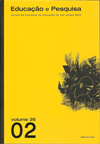O Senhor Director: fragmentos de uma história de actores e práticas escolares em Portugal
DOI:
https://doi.org/10.1590/S1517-97022000000200003Palabras clave:
Administração escolar, Quotidiano escolar, Sistema educacional portuguêsResumen
Este artigo procura analisar a trajectória das orientações e das práticas de administração de um director de uma escola portuguesa, entre meados de 1950 e de 1970. Por meio dela igualmente se pretende aumentar a compreensão de um conjunto de circunstâncias, processos e significados que marcaram, nesse período, a própria trajectória do sistema educativo escolar em Portugal, particularmente a que diz respeito ao alargamento da escolaridade obrigatória e à unificação dos estudos pós-primários. O texto articula seis fragmentos de uma investigação de maior escala que tomou a forma de um estudo de caso histórico-organizacional, e na qual se concretizou a história de um grupo de professores de uma disciplina escolar. As narrativas que se apresentam resultam do recurso a fontes de evidência orais (entrevistas) e escritas (documentos oficiais, imprensa pedagógica, documentos pessoais de professores, documentos do arquivo do estabelecimento escolar). Os fragmentos que aqui se apresentam e que ganham unidade em torno da figura do director resultam também do uso de matrizes micropolíticas para a análise do quotidiano escolar, razão pela qual neles se enfatizam fenómenos ligados quer à coordenação quer à disputa ao redor de interesses ideológicos e materiais, bem como às estratégias empregues na ampliação ou defesa de margens de autonomia no controlo do trabalho de administração de estabelecimentos escolares. Sobressaem, por isso, os processos que guindaram uma escola e um director ao estatuto de singulares e modelos, no âmbito da rede escolar portuguesa de então.Descargas
Los datos de descarga aún no están disponibles.
Descargas
Publicado
2000-12-01
Número
Sección
Artículos
Licencia
Los conceptos emitidos en los artículos son de exclusiva responsabilidad de sus autores y no reflejan necesariamente la opinión de la redacción.
Está permitida la reproducción total o parcial de los trabajos, siempre y cuando se indique explícitamente la fuente.
Cómo citar
O Senhor Director: fragmentos de uma história de actores e práticas escolares em Portugal . (2000). Educação E Pesquisa, 26(2), 31-49. https://doi.org/10.1590/S1517-97022000000200003



